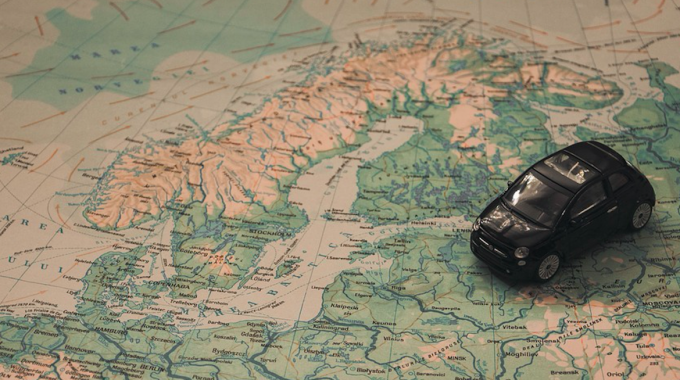
Four European paradox (Part I)
Dr. Evert van de Poll exposes four European paradox. Today we start with the first one. This is an extract of the future new edition of his book ‘Europe and the Gospel’ .
Living inside and feeling outside
To begin with, where is Europe? Are we talking about somewhere or something outside our national or cultural sphere, or about where we are, about something to which we belong?
Curiously, many people all over the continent recognise that they’re inside Europe but they feel and think and act as if they are outside. For them, Europe begins where their country ends. While they live in Europe in a matter-of-fact-way, they feel that Europe lies outside their national border, as a larger circle around it. Somehow or another, their mind’s map does not correspond to the map of physical geography, according to which Europe starts where they are, right within their country.
This ambiguity is typical for Europeans. When they talk about ‘Europe,’ they usually mean the continent excluding their own country. It is a Europe-outside-the-wall, so to speak. ‘Europeans’ are the inhabitants of neighbouring countries who speak foreign languages and have other customs. The most telling example are the British, who have a long tradition of distinguishing their country – the British Isles – and ‘the Continent’, even though the English Channel between the two is just some 30 kilometres wide. Even though Britain was already part of the Roman Empire, and an integral part of European politics and cultural life ever since. The geographic position of Britain is definitely inside Europe. But that does not prevent many British to see ‘Europe’ as ‘the Continent’, and themselves as a world a part.
This ambiguity of living inside and feeling outside is maintained by the fact that Europe as a nation does not exist. There is no such thing as a European citizenship. Our identity cards are national.
Surely, we trade with other Europeans. We have educational exchanges. We translate their books. We spend our holidays in their countries; we like to discover their historic cities, their nature resorts, their touristic attractions, their restaurants and their food. But even while border controls have disappeared in a large part of the continent, to some extent we still cross a mental border whenever we leave our national territory. Then we ‘go into Europe.’ Inversely, our neighbours who from our point of view are in ‘Europe’ do not consider themselves to be inside Europe. In their eyes, it is us who are the Europeans because we are outside their country.
Christians are no exception to this tendency to think of Europe as something outside of ‘us.’ Their churches have a national rather than a European scope. Europe as a mission field lies outside their country. But this is a misleading representation of reality. Whether we like it or not, Europe starts where we live. We are part of it. Of course, we are also Dutch, French, German, and so on, but at the same time we are European. This is our continent. This is our context. This is where we are called to be a light. Communicating the Gospel in Europe is not ‘foreign mission’ but ‘home mission.’ Inversely, what we do for the advancement of God’s Kingdom in our own country is also ‘European mission.’
These affirmations go against the grain of another trend: all over Europe people reemphasise national identities, or regional identities in the case of the Flemish, Scots, Catalans and others. A growing percentage of the population is increasingly apprehensive of further economic integration, the administrative influence of ‘Brussels,’ and attempts to go further towards a ‘deeper union’ of federation. All of that is labelled ‘Europe’ in a pejorative sense. At first, our countries wanted to be part of the European Union; as soon as they were in it they felt called to defend national interests. In the Summer of 2016, the United Kingdom went as far as putting the question to the people, by referendum. Should Britain remain in the EU or leave? A majority voted for ‘Brexit’.
In today’s multicultural societies, the majority of the population is increasingly receptive to populist ideas that capitalise on the nation, its cultural heritage, its way of life, and its tradition. All of this has to do with identity. On the one hand, there is a sense of belonging to Europe. On the other hand, people identify with their country or their region rather than with Europe as a whole.
How about Christians? To what extent do they share these trends? The question needs to be asked. All the more so since populist movements often support their ideas with a claim to the ‘Christian roots’ of Europe. What is our position in a multicultural society? These are challenging questions to which we must respond.
The first thing to do, is realising that we are in Europe. We are part and parcel of it, and we are in it together with many others. Europe is not only ‘them,’ not only ‘us,’ but ‘all of us,’ because we are many countries, many languages, many religious communities and many ways of life. Europe does not begin where I cross the border and when I try and understand another language. Europe begins where I live and attend church. I am in Europe even when I speak my own language. Studying Europe is a good way to put local things in a wider perspective. And maybe it will help us to get rid of some chauvinist pride and prejudice as we come to appreciate others.
Evert van de Poll
Professor of Religious Science and Missiology at Evangelical Theological Faculty, Leuven and a pastor with the French Baptist Federation.

This Post Has 0 Comments